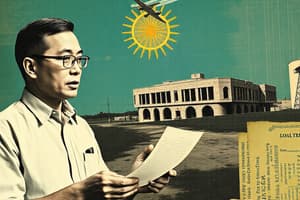Podcast
Questions and Answers
What are grants in the context of local governments?
What are grants in the context of local governments?
- Repayable funds borrowed from organizations
- Funds used to accomplish specific purposes without repayment (correct)
- Resources allocated for infrastructure improvements
- Investments made by local governments in federal programs
What is the purpose of budgeting in local governments?
What is the purpose of budgeting in local governments?
- To restrict the use of funds across various departments
- To reduce financial stability and sustainability
- To allocate unlimited resources to every department equally
- To meet predetermined objectives with allocated resources (correct)
What is the significance of the planning stage in local government budgeting?
What is the significance of the planning stage in local government budgeting?
- It allocates funds without considering objectives
- It monitors revenue collection
- It borrows funds for infrastructure improvements
- It identifies goals and priorities for the fiscal year (correct)
How does monitoring contribute to effective budgeting in local governments?
How does monitoring contribute to effective budgeting in local governments?
What is the main goal of local treasury management in municipalities?
What is the main goal of local treasury management in municipalities?
How do loans differ from grants in the context of funding for local governments?
How do loans differ from grants in the context of funding for local governments?
Which of the following is NOT a component of revenue collection for a local treasury?
Which of the following is NOT a component of revenue collection for a local treasury?
What type of tax is typically levied by local governments on homes and businesses?
What type of tax is typically levied by local governments on homes and businesses?
User fees are collected for which of the following services?
User fees are collected for which of the following services?
What is the primary purpose of a local treasury?
What is the primary purpose of a local treasury?
Which of the following is NOT a source of revenue for a local treasury?
Which of the following is NOT a source of revenue for a local treasury?
What is the primary function of a local treasury regarding budgeting?
What is the primary function of a local treasury regarding budgeting?
Flashcards are hidden until you start studying
Study Notes
Local Treasury
A local treasury is the financial management system of a municipality or city. It involves the collection of revenues from various sources, such as taxes, fees, fines, and other public funds. This article will discuss the role of a local treasury in revenue collection and budgeting, highlighting key aspects of each process that ensure efficient financial management within local governments.
Revenue Collection
Revenue collection refers to the systematic gathering of financial resources through taxation, user charges, grants, loans, and other means. In the context of local treasuries, this process can involve several components:
Taxation
Taxes are levied by government authorities to generate revenue based on the income, property, sales, or consumption of individuals and businesses within their jurisdiction. For example, a city may impose a property tax on its citizens' homes and businesses. A portion of these revenues could go towards maintaining public infrastructure like roads, parks, or community facilities. Sales taxes, on the other hand, might depend on consumer spending patterns while income taxes target the disposable earnings of residents.
User Fees & Charges
User fees are collected for services provided directly to individual citizens or businesses, such as permitting applications, bill payments, or collecting fees for using certain facilities like parking garages or recreational centers. These charges either directly fund these services or contribute to their maintenance costs.
Grants & Loans
Grants are non-repayable funds given by one organization to another with the expectation that the recipient organization will use those funds to accomplish a specific purpose. In the case of local governments, they often receive federal grants for programs that align with national priorities. Similarly, loans are borrowed funds which must be repaid under specific terms agreed upon between the lender and borrower.
Budgeting
Budgeting is a process that involves allocating resources, including funds, to meet predetermined objectives or goals within a given time frame. In local governments, budgeting enables the allocation of limited resources across various departments and services while ensuring financial stability and sustainability. The process typically includes these steps:
Planning
The planning stage involves identifying objectives, goals, and priorities for the upcoming fiscal year. These could include infrastructure improvements, community projects, public safety enhancements, or economic development initiatives.
Forecasting
Forecasting entails estimating potential revenues based on historical trends, demographic changes, and other factors affecting revenue sources. This step helps determine whether projected income will meet anticipated expenses during the budget period.
Allocation
Once revenues have been estimated, they are allocated among various departments according to their priority levels and funding requirements defined during the preliminary stages.
Monitoring
Monitoring serves as ongoing review throughout the budget cycle to ensure that funds remain allocated appropriately and efficiently towards meeting established targets.
In conclusion, local treasury management plays a crucial role in maintaining financial health within municipalities. By overseeing revenue collection and implementing effective budgeting strategies, local governments can effectively allocate resources, prioritize spending, and optimize service delivery to improve quality of life for their residents.
Studying That Suits You
Use AI to generate personalized quizzes and flashcards to suit your learning preferences.




